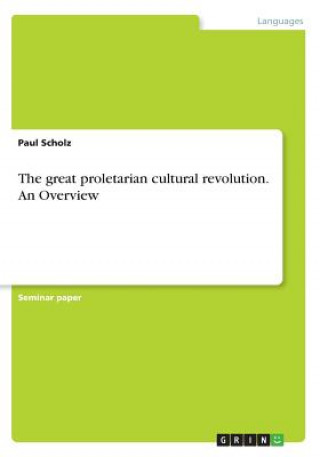
Kód: 16827027
The great proletarian cultural revolution. An Overview
Autor Paul Scholz
Seminar paper from the year 2016 in the subject Orientalism / Sinology - Chinese / China, grade: 1,3, Tsinghua University, language: English, abstract: The Chinese Cultural Revolution, also well known as the Great Proletarian Cult ... celý popis
- Jazyk:
 Angličtina
Angličtina - Vazba: Brožovaná
- Počet stran: 20
Nakladatelství: Grin Publishing, 2017
- Více informací o knize

Mohlo by se vám také líbit
-

Dune
262 Kč -

Haunting Adeline
617 Kč -

Berserk Deluxe Volume 2
1050 Kč -

White Nights
90 Kč -

Powerless
259 Kč -

Atomic Habits
340 Kč -

Dune Messiah
178 Kč -

Berserk Deluxe Volume 3
1138 Kč -

One Day
276 Kč -

Berserk Deluxe Volume 1
1033 Kč -

Iron Flame
353 Kč -

Surrounded by Idiots
256 Kč -

Harry Potter and the Prisoner of Azkaban (Minalima Edition)
688 Kč -

Gravity Falls Journal 3
440 Kč -

Heaven Official's Blessing: Tian Guan Ci Fu (Novel) Vol. 1
426 Kč -

The Creative Act
544 Kč -

Dune
214 Kč -

Hunting Adeline
633 Kč -

A Little Life
276 Kč -

Children of Dune
174 Kč -

Heaven Official's Blessing: Tian Guan Ci Fu (Novel) Vol. 2
441 Kč
Darujte tuto knihu ještě dnes
- Objednejte knihu a zvolte Zaslat jako dárek.
- Obratem obdržíte darovací poukaz na knihu, který můžete ihned předat obdarovanému.
- Knihu zašleme na adresu obdarovaného, o nic se nestaráte.
Více informací o knize The great proletarian cultural revolution. An Overview
Nákupem získáte 104 bodů
 Anotace knihy
Anotace knihy
Seminar paper from the year 2016 in the subject Orientalism / Sinology - Chinese / China, grade: 1,3, Tsinghua University, language: English, abstract: The Chinese Cultural Revolution, also well known as the Great Proletarian Cultural Revolution - Wuchanjieji Wenhua Dageming, describes a unparalleled and from the top established revolution launched by Chinese Communist Party (CCP) chairman Mao Zedong during his very last period in power (1966-76) to restore the spirit of the Chinese Revolution (Lieberthal 2016). Mao Zedong during this time feared that China possibly could develop like the Soviet Russian nation did and he did not want China to follow their example. He was very concerned about China's and his own place in history and therefore did not hesitate to throw China's cities into chaos in a big effort to reverse the historic processes which were on their way obviously. Plenty of the events during this period of this time are without equal in the modern world's history. After the catastrophic Great Leap Forward, in which according to some sources more than 45 million people died, Mao Zedong decided to take a passive role in governing China. More practical and moderately oriented leaders, such as Vice-Chairman Liu Shaoqi and Premier Zhou Enlai, introduced soft economic reforms founding on individual incentives - such as allowing private people to farm their own land -an effort to rebuild and strengthen the heavily harmed economy (Leese 2016). Mao disliked such actions, as they went against the principles of pure communism in which he believed deeply. In fact, China's economy grew sustainably from 1962 to 1965 with the more conservative economic policies applying (Stanford 2001). [...]
 Parametry knihy
Parametry knihy
Zařazení knihy Knihy v angličtině Language Language: reference & general
1042 Kč
- Plný název: The great proletarian cultural revolution. An Overview
- Autor: Paul Scholz
- Jazyk:
 Angličtina
Angličtina - Vazba: Brožovaná
- Počet stran: 20
- EAN: 9783668484719
- ISBN: 3668484716
- ID: 16827027
- Nakladatelství: Grin Publishing
- Hmotnost: 44 g
- Rozměry: 210 × 148 × 1 mm
- Rok vydání: 2017
Osobní odběr Praha, Brno a 12903 dalších
Copyright ©2008-24 nejlevnejsi-knihy.cz Všechna práva vyhrazenaSoukromíCookies



 Vrácení do měsíce
Vrácení do měsíce 571 999 099 (8-15.30h)
571 999 099 (8-15.30h)